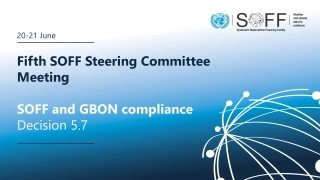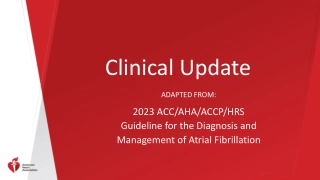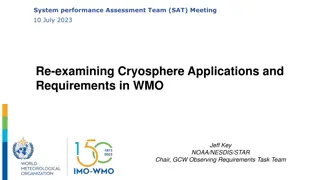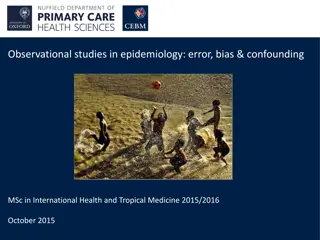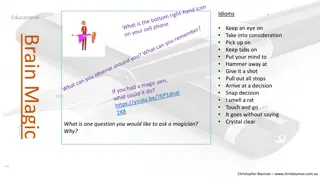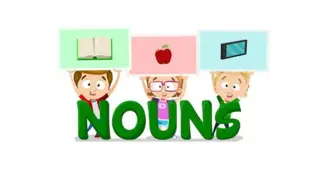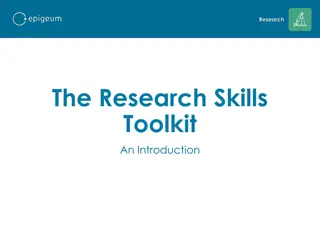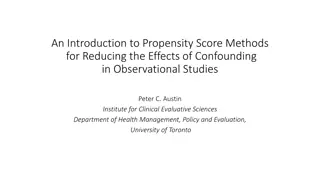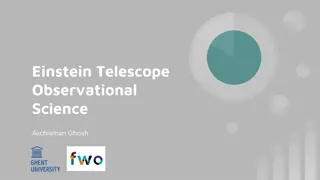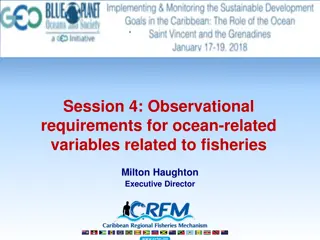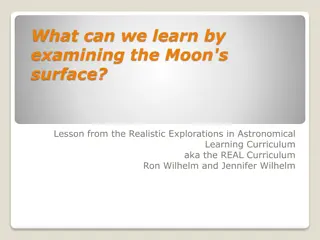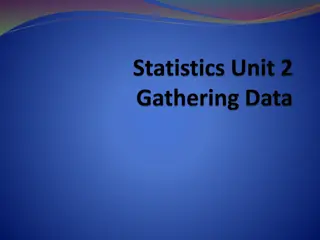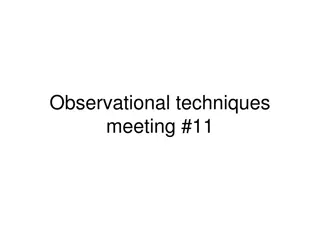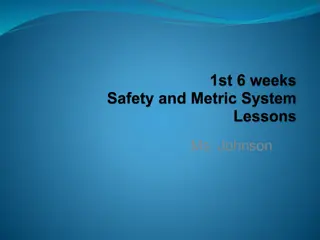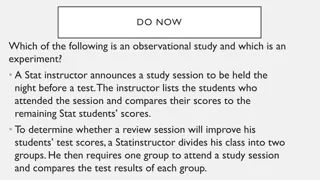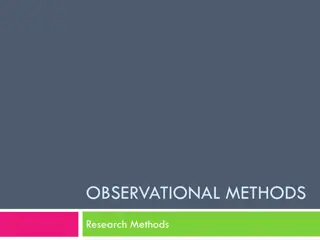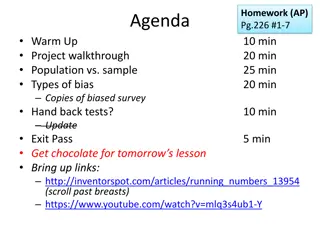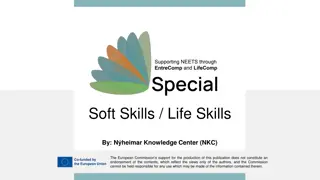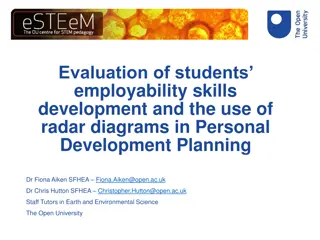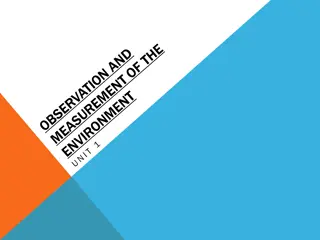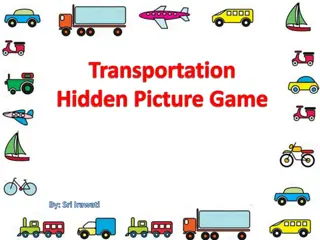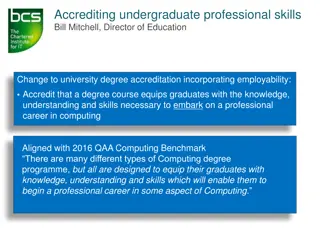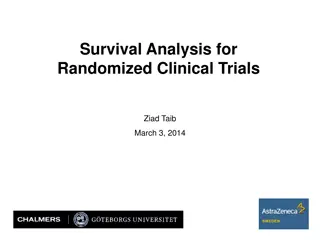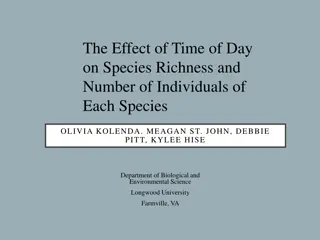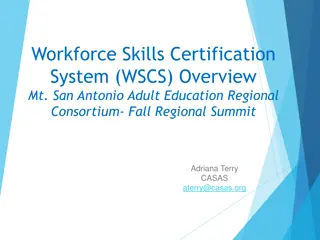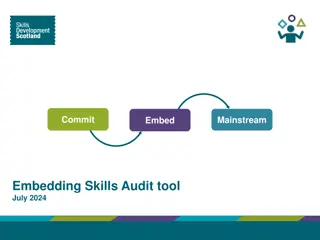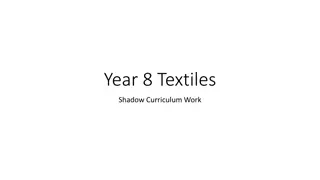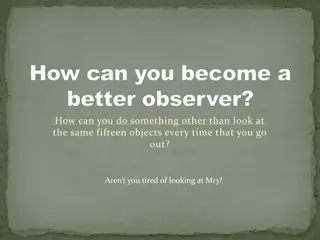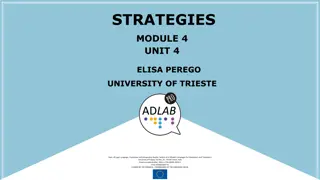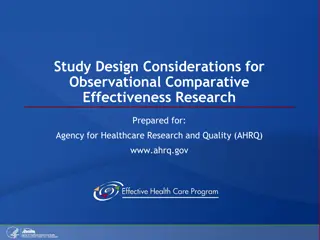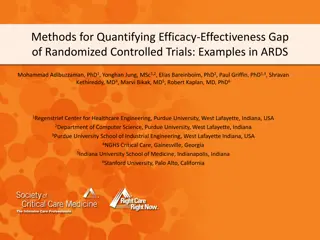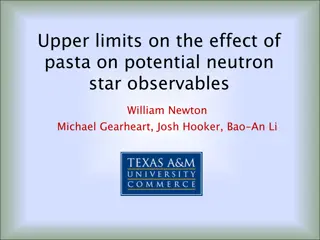Fifth SOFF Steering Committee Meeting
The decisions made during the 5th SOFF Steering Committee Meeting regarding the compliance of stations with GBON requirements. It emphasizes the need to secure an adequate supply of observational data for global NWP centers and highlights the importance of station compliance, data exchange, and main
21 views • 8 slides
Understanding Observed Changes in Atmospheric Solar Reflection and Surface Albedo
Exploring the attribution of changes in Earth's Albedo Shortwave Radiation (ASR) to various processes including atmospheric and surface contributions. The impacts of incident solar radiation, cloud reflection, absorption, and surface albedo are analyzed, along with the radiative sensitivity from iso
0 views • 12 slides
Clinical Update
This clinical update presents the 2023 ACC/AHA/ACCP/HRS guideline for diagnosing and managing atrial fibrillation. It categorizes recommendations based on class of recommendation and level of evidence, ranging from strong to weak. Recommendations are supported by high-quality evidence from randomize
1 views • 46 slides
Understanding Investigations in Science
Investigating in science involves various approaches beyond fair tests, such as pattern-seeking, exploring, and modeling. Not all scientists rely on fair tests, as observational methods are also commonly used. The scientific method consists of steps like stating the aim, observing, forming hypothese
1 views • 20 slides
Understanding Quantitative Research Designs in Health Research
Quantitative research designs play a crucial role in health research, offering various methodologies like experimental and observational designs. Observational designs are commonly used and can establish associations but not causality. Longitudinal designs track outcomes over time, providing valuabl
3 views • 25 slides
Re-examining Cryosphere Applications and Requirements in WMO - SAT Meeting Summary
The System Assessment Team (SAT) meeting on 10th July 2023 revolved around re-evaluating cryosphere applications and requirements within WMO. Jeff Key from NOAA/NESDIS/STAR chaired the meeting, focusing on updating and expanding observational requirements for the cryosphere. The cryosphere, encompas
5 views • 26 slides
Understanding Observational Studies in Epidemiology
Delve into the realm of observational studies in epidemiology, exploring concepts such as error, bias, and confounding. Discover the significance of various study designs, from case reports to prospective cohort studies, in elucidating associations and establishing causality in non-communicable dise
0 views • 58 slides
Importance of Teaching Life Skills for Healthy Child Development
Life skills education plays a crucial role in promoting healthy child and adolescent development by enhancing adaptive behavior, problem-solving abilities, and social skills. It encompasses three core areas: thinking skills, social skills, and emotional skills. Teaching life skills is essential for
4 views • 15 slides
Dive into the World of Magic and Mind Tricks
Explore the fascinating realm of magic as the magician mesmerizes with mind-bending tricks. From illusions to decision-making, uncover the secrets behind the magic and test your observational skills.
0 views • 4 slides
Exploring the Evolution of Music, Fascination with Hawaii, and the Impact of Invention and Observation
This content delves into the evolution of popular music, the intriguing charm of Hawaii's Big Island, the transformative power of inventions, and the significance of keen observation. It highlights how music has developed through the ages, the allure of Hawaii's Big Island, the rapid changes brought
0 views • 11 slides
Enhancing Research Skills with Epigeum's Research Skills Toolkit
Epigeum, a leading provider of online courseware, offers the Research Skills Toolkit, comprising five core programs designed to equip postgraduate researchers with key skills and knowledge. Developed from the Research Skills Master Programme, the Toolkit integrates interactive learning design, user-
1 views • 9 slides
Understanding Clinical Trials: Types and Designs
Clinical trials are essential research studies that evaluate new tests and treatments to improve human health outcomes. They involve various phases, designs, and purposes, such as treatment trials, prevention trials, and observational studies. Different types of clinical trial designs include experi
7 views • 18 slides
Understanding Propensity Score Methods for Reducing Confounding in Studies
This content discusses the use of propensity score methods to address confounding in observational studies, comparing randomized control trials (RCTs) with observational studies, explaining the potential outcome framework, average treatment effects, and common assumptions made in these methods to re
0 views • 12 slides
Exploring the Einstein Telescope: Observational Science and Board Details
Delve into the world of observational science with the Einstein Telescope (ET). This comprehensive overview covers the involvement of Flanders researchers, gravitational wave sources, ET's detection capabilities, and its significant contributions to black hole and neutron star properties. Learn abou
1 views • 12 slides
Fisheries Management and Observational Requirements for Ocean-Related Variables
This content provides insights into observational requirements for ocean-related variables concerning fisheries, focusing on marine fish production in CRFM countries, the Flyingfish Management Plan, Caribbean Spiny Lobster management, and other fisheries management plans. It discusses the main objec
0 views • 18 slides
Observational Constraints on Viable f(R) Gravity Models Analysis
Investigating f(R) gravity models by extending the Einstein-Hilbert action with an arbitrary function f(R). Conditions for viable models include positive gravitational constants, stable cosmological perturbations, asymptotic behavior towards the ΛCDM model, stability of late-time de Sitter point, a
1 views • 12 slides
Moon Investigation: Craters, Highlands, and Maria
Explore the Moon's surface like a detective! Analyze craters, highlands, and maria to determine their origins and age. Learn how to differentiate between features and debunk the myth of lunar oceans. Use your observational skills to piece together the Moon's history.
0 views • 14 slides
Essential Elements of Clinical Trial Protocols
Understanding the key components of a clinical trial research protocol is essential for conducting successful studies. This includes identifying session objectives, discussing trial protocol contents, exploring observational study elements, and learning about reporting guidelines. Study objectives f
1 views • 25 slides
Choosing Between Observational Study and Experiment in Research
Observational studies involve recording data without interfering with subjects, while experiments impose treatments on subjects to establish cause and effect. A well-controlled experiment is crucial for determining causation, while observational studies can provide quick results at lower costs. Each
0 views • 24 slides
Overview of Observational Techniques and Student Talks in Astronomy
This content covers observational techniques, student talks, and dates related to various astronomical topics such as gamma-ray astronomy, basics of gamma-ray interaction, scintillators and solid-state detectors, Compton telescopes, and pair telescopes. It provides insights into the main processes i
0 views • 23 slides
Engaging Science Observation Activity for Students
Explore the essential skill of observation in science through a multi-sensory activity where students use touch, hearing, sight, and smell to describe an object. This hands-on approach fosters critical thinking and enhances scientific understanding by differentiating between facts and opinions. Enco
0 views • 60 slides
Understanding Observational Studies vs. Experiments in Statistical Analysis
Explore the distinction between observational studies and experiments in statistics through practical examples like a Stat instructor evaluating a review session's impact on test scores. Learn about sampling methods, bias avoidance, and the implications of statistical study design. Discover how anal
1 views • 12 slides
Understanding Observational Research Methods
Observational research methods involve systematic observation of behaviors and can be used in various study designs such as experimental, correlational, and descriptive research. This type of research aims to provide insights into real-world behaviors with a focus on ecological validity. The process
0 views • 14 slides
Understanding Experimental Design and Bias in Statistics
Explore key concepts in statistics such as observational studies, experiments, bias, and sampling methods. Delve into the difference between observational studies and experiments, understand the impact of bias in research, and learn about sampling techniques like simple random sampling and stratifie
0 views • 22 slides
Explore Unique Homes and Proverbs with Fun Word Fill-Ins
Delve into a world of unusual houses, familiar proverbs, and engaging word puzzles. Discover the essence of home through timeless sayings and challenge yourself with missing word prompts. Identify various rooms in a house and test your observational skills in identifying odd words. Dive into this in
0 views • 29 slides
Soft Skills and Life Skills Overview
Soft skills, also known as life skills or people skills, encompass interpersonal and social abilities that enable effective interaction with others. They are acquired through daily life experiences and reflections, in contrast to hard skills gained through formal education. This overview delves into
0 views • 36 slides
Evaluation of Students' Employability Skills Development Using Radar Diagrams in Personal Development Planning
This study focuses on assessing students' employability skills development through the use of radar diagrams in Personal Development Planning (PDP). The research evaluated students' self-assessment and reflection on skills improvement with a specific focus on collaborating with others and self-refle
0 views • 18 slides
Enhancing Observational Skills through the 5 Senses and Devices
Explore how the 5 senses - sight, touch, hearing, taste, and smell - interact with our environment and how observations can be enhanced using specialized devices beyond human senses. Discover examples like a graduated cylinder, microscope, spring scale, wind vane, and compass that extend observation
0 views • 146 slides
Transportation Hidden Picture Game by Sri Irawati
Enjoy a fun transportation-themed hidden picture game designed by Sri Irawati. Search for various types of vehicles like paddle boats, helicopters, cars, buses, motorbikes, mountain bikes, yachts, canoes, inline skates, mopeds, airplanes, trucks, rockets, motorboats, and submarines in engaging illus
0 views • 16 slides
Accreditation Evolution for Computing Degree Programs
Bill Mitchell, Director of Education, proposes an evolution in university degree accreditation to incorporate employability skills for graduates pursuing professional careers in computing. The accreditation process emphasizes aligning with national skills criteria, engaging employers, and recognizin
0 views • 16 slides
Understanding Survival Analysis in Clinical Trials
Survival analysis plays a crucial role in analyzing data from randomized clinical trials, observational studies, and experiments. It involves estimating the survival function, conducting the log-rank test, and identifying when to use this analytical approach. Elements of survival experiments, standa
0 views • 73 slides
Effect of Time of Day on Bird Species Richness and Individuals
The study investigates how the time of day impacts the species richness and number of individuals of birds at a specific feeder in Longwood University's Environmental Education Center. Through observational studies and counting, the researchers aim to determine if there are differences in bird popul
0 views • 20 slides
WSCS - Workforce Skills Certification System Overview
The Workforce Skills Certification System (WSCS) aims to help learners transition into the workforce by developing and certifying their work readiness skills valued by employers. Through a three-step process, learners can profile, develop, and certify their skills to increase employability. The syst
0 views • 27 slides
Embedding Skills Audit Tool: Self-Evaluation Guide for Establishments
The Embedding Skills Audit Tool is designed to help establishments self-evaluate their skills approach against illustrative statements for the commit, embed, and mainstream stages. This tool provides guidance on scoring, focused discussions, and action planning to enhance skills implementation. By f
0 views • 7 slides
Year 8 Textiles Curriculum Projects: Creative Tasks for Students
Dive into the exciting Year 8 Textiles curriculum projects featuring textile artist Lucy Sparrow's influence. Students will explore observational drawing, moodboards, appliqué, and various creative tasks inspired by food-themed soft sculptures. Follow along with the weekly tasks to hone your textil
0 views • 6 slides
Enhancing Your Skills as an Astronomical Observer
Elevate your observational skills by learning to explore beyond familiar objects like M13. Discover techniques for selecting, locating, and observing various celestial bodies, aided by observing lists, star atlases, and different telescope types. Understand the importance of aperture and delve into
1 views • 37 slides
Effective Strategies for Creating Engaging Advertisements
Discover effective strategies for formulating engaging advertisements, such as observational skills, writing skills, and concise language use. Explore the use of meticulous, visually intense, and usable content to captivate audiences in the realm of visual arts and museum advertisements. Learn about
0 views • 17 slides
Study Design Considerations for Observational Comparative Effectiveness Research
This presentation outlines key considerations for study design in observational comparative effectiveness research, including rationale for design choice, defining start of follow-up, inclusion/exclusion criteria, exposures of interest, outcomes, and potential confounders. It discusses various study
0 views • 16 slides
Methods for Quantifying Efficacy-Effectiveness Gap in Randomized Controlled Trials
This research discusses the quantification of the efficacy-effectiveness gap in randomized controlled trials (RCTs), particularly focusing on examples in Acute Respiratory Distress Syndrome (ARDS). It explores the challenges of RCTs, ethical considerations, and the use of observational data for caus
0 views • 8 slides
Exploring Pasta Phase in Neutron Stars: Upper Limits and Observational Effects
Investigating the impact of pasta phase on neutron star observables, this research by William Newton, Michael Gearheart, Josh Hooker, and Bao-An Li discusses the crust composition, transition densities, and compressible Liquid Drop Model (CLDM). The study explores the uncertainties in symmetry energ
0 views • 30 slides
